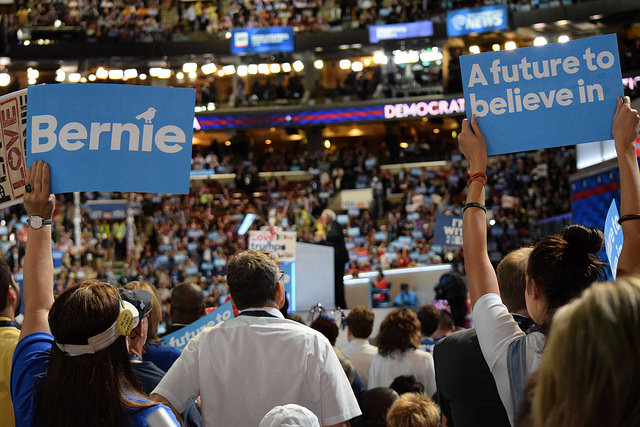Like this article? rabble is reader-supported journalism. Chip in to keep stories like these coming.
Besides providing some powerful lines for Melania Trump’s next speech, Michelle Obama reminded us this week how inspiring the Democrats can be at their best.
Indeed, while Donald Trump has grabbed political centre stage due to his sheer loutishness and the fierceness with which he’s disemboweled the party of Abraham Lincoln, it may be the Democratic Party that is undergoing the more intriguing and far-reaching transformation.
After years of drifting towards the centre, the Democratic Party has been profoundly shaken by the insurgent populist campaign of Senator Bernie Sanders.
Of course, Hillary Clinton is the Democratic nominee, but the clout exercised by the millions of energized, committed Sanders supporters is reflected in the party’s unusually progressive platform and the prominence the party has felt obliged to give to Sanders and Senator Elizabeth Warren, whose popularity is further proof that the demise of Occupy Wall Street has been greatly exaggerated.
The youthful Sanders crowd, which threatened to derail the convention on opening day, isn’t likely to go away. It’s determined to shape the Democratic Party of the future, believing that the only way to respond to the class war being waged by an aggressive billionaire class is with backbone — a body part that’s been noticeably missing from Democrats in recent decades.
In the midst of the 1930s Depression, Democratic President Franklin Roosevelt showed backbone, championing unions, bringing in universal pensions, taxing the rich and restraining Wall Street with the Glass-Steagall Act. Addressing a wildly cheering crowd at Madison Square Gardens in 1936, Roosevelt vowed to defy the enraged bankers and financial tycoons lined up against him. “They are unanimous in their hate for me — and I welcome their hatred!”
Roosevelt’s New Deal ushered in a postwar era in which workers made impressive economic gains as a rising middle class while the wealthy elite lost ground.
Starting in the late 1970s, however, the elite launched a forceful counteroffensive with the support of the Republican party, and the Democrats were surprisingly weak in defending the economic gains they’d help win for ordinary people.
Indeed, the Democratic Party had soon virtually abandoned working people, realigning itself with Wall Street and voting with Republicans for financial deregulation and dramatically lower taxes on the rich.
All this only encouraged the financial elite to become more grasping and assertive. When President Obama took the minimal step of trying to close a notorious tax loophole favouring hedge fund managers, Wall Street billionaire Stephen Schwarzman responded with outrage. “It’s war,” he declared. “It’s like when Hitler invaded Poland in 1939.”
Republicans sided with Schwarzman and other angry billionaires. Even though the Democrats initially had control of the White House and both houses of Congress, they capitulated, thereby maintaining a tax loophole that delivers billions of dollars in tax savings to some of the least needy people on the planet.
Not content to protect their own tax breaks, the Wall Street barons, including American Express CEO Harvey Golub, went on the offensive, demanding an end to tax breaks that helped low-income Americans — a group dubbed “lucky duckies” by the Wall Street Journal for their low-tax status.
Perhaps most stunning has been the failure of the Democrats to mount even a feeble defence of the estate tax, which has been the pillar of progressive taxation in the U.S. for more than a century, since it taxes only the richest of the rich. (Estates below $5.4 million are tax-free.)
When George W. Bush moved to cutback the estate tax, the Democrats quickly succumbed, offering no real opposition as the Republicans gutted it — despite the wealth of America’s richest families being at an all-time high — further contributing to the dominance of the billionaire class.
Much has been said about the alleged populism of Donald Trump, described by his son as a “blue-collar billionaire” — a description that fits Trump, who lives in a $100 million Versailles-style marble-and-gold penthouse, about as well as it fits Louis XIV.
Trump is calling for a new round of staggeringly large tax cuts for the rich — including an average income tax cut of $275,000 for the 1 per cent and the complete elimination of the estate tax. As for the working poor: Trump opposes an increase in the federal minimum wage and has floated the idea of abolishing it altogether, allowing states to compete in setting ever-lower minimum wages.
The forces unleashed by Bernie Sanders hunger for a real populism, and they’re unlikely to settle for anything less than a party that once again shows backbone against bellicose billionaires.
Linda McQuaig is a journalist and author. Her most recent book (with Neil Brooks) is The Trouble with Billionaires: How the Super-Rich Hijacked the World and How We Can Take It Back. This column originally appeared in the Toronto Star.
Photo: Disney | ABC Television Group/flickr
Like this article? rabble is reader-supported journalism. Chip in to keep stories like these coming.




